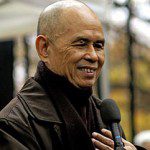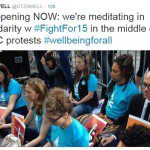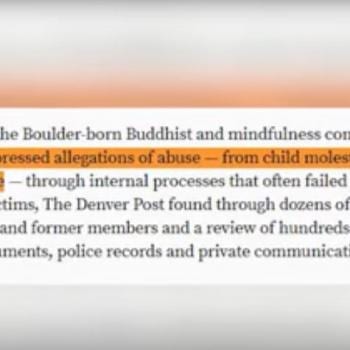While mindfulness and meditation have taken off in the popular media in the last couple of years, it has been a while since I’ve seen a celebrity openly acknowledging a conversion to Buddhism. But this week in a CNN article, ABC anchorman Dan Harris does just that, writing:
If you had told me as recently as a few years ago that I’d ever become a Buddhist — never mind that I might even admit to it publicly — I would have coughed my beer up through my nose.
I was raised by secular scientists in The People’s Republic of Massachusetts. (I did have a Bar Mitzvah — but only for the money.) I’ve spent my career as a proud skeptic. My favorite part of being a journalist is the right — the obligation, really — to doubt everything and everyone.
And yet, here I am … a Buddhist.
In the article, a re-write from the video linked below, Harris describes his journey from a staunchly secular-Jewish upbringing through workaholism, drugs, a panic attack, therapy, and, eventually, mindfulness meditation and Buddhism.
Harris makes a growingly common claim at the outset. He says, “Buddhism is not really a faith — at least not as I understand or practice it.” In studying religions today, we try to avoid using the word “faith” as a synonym, even though it may have been in the past and is still used as such in popular speech. This is because the link of faith and religion comes from the Jewish, Christian, and Muslim religions where (for many) to be “inside” the religion is a matter of what you believe, or where your faith lies. It’s much more complicated than that, especially with Judaism, but I digress.
With the arrival of non-Western religions on the academic scene, especially in the 1950s-70s, the definition of “religion” grew and twisted and contorted. In the textbook I used for three years of teaching World Religions, the definition given (after a great array of quotations ranging from Friedrich Schleiermacher and Karl Marx to Mark Twain and Goldie Hawn) is:
Religion is a pattern of beliefs and practices that expresses and enacts what a community regards as sacred and/or of ultimate value.
Buddhism fits well into this and is generally regarded as one of the “big 5 (or 7 or 10….)” world religions. However, many people today are taking up Buddhism without:
a) much sense of community; these ‘nightstand Buddhists’ read the books, perhaps meditate and maybe every so often go to a sitting group or retreat, but they don’t find themselves in the sort of ‘religious community’ imagined and studied by academics
or
b) much sense of a shared beliefs or an “ultimate value” with other Buddhists. The Buddhism of many today is perfectly compatible with neo-liberal capitalism, while for others, Buddhism demands socialism, anarchism, or a profound commitment to social activism.
So scholars like myself are left scratching our heads. Is Buddhism becoming an even more amorphous category (perhaps it long has been!)? Can a person who has zero connection with any Buddhist community really be a Buddhist? Can books and perhaps an online chat experience count as community? Can Buddhism be used as a tool for or adjunct to another set of ultimate values?
Harris certainly seems to think that Buddhism escapes the category of religion altogether, as he writes:
… this “religion” is not, in my view, really a religion.
As the writer Stephen Batchelor (author of the excellent book, “Buddhism Without Beliefs”) has said, Buddhism is “not something to believe in but something to do.” (Emphasis mine.)
The Buddha did not claim to be a God or a prophet. And to the extent that he espoused ideas such as karma and rebirth — he explicitly told his followers to take them or leave them. He didn’t even envision something called Buddhism; he was just teaching his followers to meditate and behave ethically.
Ethics, Meditation, and… What important part of the path is Harris leaving out here? Wisdom. There is a philosophical structure to the Buddha’s thought that did differentiate it from other religio-philosophies of his day. Just as with other aspects of Buddhism, how obvious you find this structure and how important you think it is to your own practice will vary from person to person. Harris continues:
It is certainly true, though, that in many parts of the world, people do practice Buddhism as a religion — complete with elaborate metaphysical claims. But again, you are under no obligation to accept these. And if you are worried that practicing Buddhism will erode your preexisting religious beliefs, it’s worth noting that many people of faith say Buddhist meditation has helped them cut down on the mental noise and thereby feel closer to God. One theologian even wrote a book called “Without the Buddha I Could Not Be a Christian.”
The author of that book was Paul Knitter, and you can read more about a short movie featuring him, Jesus & Buddha: Practicing Across Traditions, from my review here. Harris concludes on why he named his book 10% Happier:
While I’m clearly a big fan of Buddhism, I hasten to add that it definitely won’t solve all of your problems.
I’ve learned the hard way that it won’t make you taller or regrow your hair…
Obviously [10% Happier is] an absurdly unscientific estimate, but I like it — because it’s true enough, and it sounds like a good return on investment. It’s also a way to counterprogram against the reckless overpromising I’ve seen in so much of the self-help world.
After six years of meditating, I am far from enlightened. (If my wife were writing this article, she’d call it, “90% Still A Moron.”)
But mindfulness has dramatically cut down on my levels of useless rumination, mindless misbehavior, counterproductive crankiness and general distractedness.
As a long-time practitioner I can certainly concur with these observations. And as a student/scholar of the religion, I’ll be interested to see if this grows into a larger wave of celebrity convert-Buddhists, openly declaring their non-religious religious affiliation in CNN and elsewhere, or if it will fade in obscurity in contrast to the continued growth of mindfulness and meditation stripped of its Buddhist ethical foundations and philosophical framework.
Below are a couple clips from the full video Harris gave at Google last fall and the full clip below.
Speaking of the self-help world, in the video we see his response to interviewing Eckhard Tolle:
Here, Harris describes his first impressions of meditation:
At the end of that clip you see Mattheu Ricard, who was famously termed “the happiest man in the world.” Here is the full 50 minute video:












